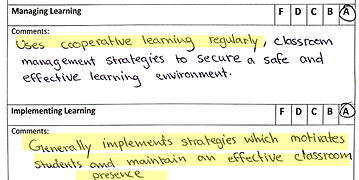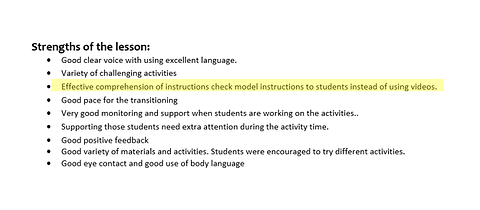Reports and Observations
Page overview:
This page includes reports written by my Mentoring School Teacher (MST), and Mentoring College Teacher (MCT) based on my performance during teaching practice.
Mentoring School Teacher's (MST) Reports
Observation Report 1
Observation Report 3
Observation Report 2
Final Observation Report
Mentoring College Teacher's (MCT) Reports
Lesson Observation
Professional Development Plan (PDP) Observation
Comments and Feedback
Teaching Competency: Implementing Learning
Mentoring School Teacher
Area for Development
Improvement


At first, I had spent a significantly long time on introducing the lesson, so my MST advised that I lessen the time of the explanation segment.
I gave students the opportunity to work together to understand the topic through cooperating and communicating, making them more active participants of the lesson.
Rationale
According to Tsegaye and Davidson Teacher Talk Time (TTT) should be deducted from so students don't lose the motivation to listen and learn (Tsegaye & Davidson, 2014). Therefore, students should be active participants in the classroom.
Mentoring College Teacher
Area for Development

My college mentor explained that I should model activities for children in a more explicit manner.
Rationale
I need to work on modelling explicitly and clearly for students prior to an activity, because learners in the classroom can only be able to perform efficiently if the steps to a process are clearly modelled (Woollard, 2010, p.6).
Teaching Competency: Managing Learning
Mentoring School Teacher
Area for Development

Overall, I still need to work on my classroom management skills, whereby I am able to enforce rules, and reinforce them. One goal I would like to focus on, which is also a Professional Development Plan (PDP) goal of mine, is to control students' voice levels in the classroom, which will help in managing their behavior.
Strengths
Teaching Competency: Planning for Learning
Mentoring School Teacher
Mentoring College Teacher

My MST's comment shows that I have done well in planning in a detailed way, using testable objectives and that lead to an effective delivery.

One of my strengths in planning, according to my MCT is the balance of effective and student centered lesson plans.
Rationale
Maintaining a positive classroom environment is one of the responsibilities of a competent teacher (Aina & Olanipekun & Garuba, 2015). Therefore I would like to be successful at doing so
Rationale
A successful lesson is one that has been planned for thoroughly and is outlined on a detailed lesson plan, giving the teacher a clear direction for the lesson (Cunningham, 2009).
Teaching Competency: Assessment
Mentoring School Teacher

I made use of differentiation in order to assess students based on their needs, avoiding bias when evaluating their work.
Rationale
Mentoring College Teacher

I implemented various formative assessment strategies such as the use of a rubric, as well as a hands-on quiz to assess students. In addition, I used feedback to alert students on things they need to improve, and what they did well. Constructive feedback is an aspect of learning that I believe to have a big impact on learning, which is why it plays a role in my philosophy in teaching.
Using formative assessment to gauge students' understanding of the topic is an essential aspect of learning (Hanover Research, 2014). Teachers must not only depend on summative assessments, but also focus on assessing learning that happens on a daily basis.
Teaching Competency: Reflection on Practice
Mentoring School Teacher

My reflections focus on my own pedagogical strategies, and how they affect students' learning. Therefore, I'm always looking for ways to improve myself.
Mentoring College Teacher

After each lesson, I make sure to ask any observer of how they think I did, whether it's my peers or other teachers who were in the classroom.
Rationale
According to Ward and McCotter (2004), it is important to consider other people's perspectives when reflecting on one's own practices (Ward & McCotter, 2004). Thus, holding conversations with others about our own approaches broadens our viewpoint about teaching.